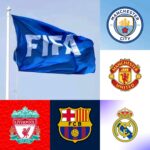Man Utd, Liverpool and Man City ‘stripped’ of title as FIFA make controversial decision

The football world witnessed a seismic shift in how global club supremacy is recognized when FIFA made a landmark decision that has sent shockwaves through the sporting community. In a move that has fundamentally altered the landscape of international club competition, world football’s governing body has essentially rewritten history by stripping multiple prestigious clubs of their world champion status, including three of England’s most successful teams: Manchester United, Liverpool, and Manchester City.
This controversial decision stems from FIFA’s complete overhaul of the Club World Cup format and their subsequent determination to recognize only the winners of the new tournament structure as legitimate world champions. The ramifications of this decision extend far beyond mere semantics, touching the very core of how football history and achievement are recorded and celebrated.
Chelsea’s Historic Triumph in New Jersey
The catalyst for this monumental change was Chelsea’s emphatic victory over Paris Saint-Germain in the Club World Cup final, held in New Jersey last weekend. The London club delivered a masterclass performance, dismantling the French giants with a commanding 3-0 victory that left no doubt about their superiority on the night. The match served as the perfect showcase for the new tournament format, demonstrating the elevated level of competition and global reach that FIFA had envisioned.
Cole Palmer emerged as the hero of the hour, netting a brilliant brace that showcased his technical prowess and composure on the biggest stage. The young English midfielder’s performance was a testament to the rising generation of talent and provided a glimpse into the future of English football. Complementing Palmer’s heroics was Joao Pedro’s clinical strike, which effectively sealed the victory before the halftime whistle and left PSG with an insurmountable deficit.
For Chelsea, this triumph represented the culmination of years of ambition and investment. The victory was particularly sweet given their previous heartbreak in the 2012 final, when they fell to Brazilian side Corinthians in a match that had haunted the club for over a decade. Under the astute guidance of Enzo Maresca, the team demonstrated tactical sophistication and mental fortitude that befitted world champions.
The Revolutionary Tournament Format
The 2024 Club World Cup represented a complete departure from the traditional format that had defined the competition for decades. FIFA’s decision to expand the tournament to 32 teams marked the most significant evolution in international club competition since the inception of the Champions League. This expanded format brought together representatives from six confederations, creating a truly global spectacle that captured the imagination of football fans worldwide.
The new structure incorporated both group and knockout phases, mirroring the format that has made the FIFA World Cup the most watched sporting event on the planet. This approach ensured that the world’s best clubs would face multiple high-quality opponents, testing their squad depth, tactical flexibility, and mental resilience over an extended period. The group phase allowed for fascinating matchups between clubs from different continents, providing fans with unprecedented opportunities to see how different footballing philosophies and styles would clash on neutral ground.
The knockout phase intensified the drama, with single-elimination matches that carried the weight of continental pride and global recognition. This format change was designed to elevate the prestige of the tournament, transforming it from what some had considered a glorified friendly tournament into a legitimate world championship that demanded respect from players, coaches, and fans alike.
FIFA’s Controversial Classification Decision
The most contentious aspect of this entire affair lies in FIFA’s decision regarding how to classify previous Club World Cup winners. In a move that has sparked widespread debate and criticism, the governing body has determined that Chelsea should be recognized as the “first-ever” Club World Cup winners under the new format. This designation effectively relegates all previous winners to a different category entirely, fundamentally altering their place in football history.
According to reports from the Daily Mail, clubs that previously held the world champion title, including Manchester United, Liverpool, and Manchester City, will now be reclassified as “FIFA Intercontinental Champions.” This semantic shift may seem minor to casual observers, but for the clubs involved and their passionate fanbases, it represents a significant diminishing of their achievements and historical standing.
The decision has created a complex hierarchy of recognition that threatens to confuse rather than clarify the history of international club competition. Manchester United’s victories in 1999, 2008, and other years now carry a different designation than Chelsea’s recent triumph, despite both being recognized as the pinnacle of club football achievement at the time they were won.
The Intercontinental Cup Confusion
Adding another layer of complexity to this situation is the existence of multiple tournaments with similar names, creating a labyrinthine system of recognition that even seasoned football followers struggle to navigate. The current FIFA Intercontinental Cup, established as a separate competition, features six teams that have won their respective confederation’s continental cup competing in a mini-tournament held in December.
This modern Intercontinental Cup should not be confused with its predecessor, which operated between 1970 and 2004 and was contested exclusively between the winners of the UEFA Champions League and the Copa Libertadores. That earlier tournament held significant prestige and was considered by many to be the de facto world club championship before the establishment of the current Club World Cup format.
The proliferation of similarly named competitions with different formats, participants, and levels of prestige has created a situation where even football historians struggle to maintain clarity about which achievements carry the most weight. This confusion is compounded by FIFA’s latest decision, which adds yet another layer to an already complex system of recognition.
Historical Context and Implications
The ramifications of FIFA’s decision extend far beyond the immediate impact on the clubs involved. By essentially creating a historical dividing line between “old” and “new” world champions, FIFA has established a precedent that could have lasting implications for how football achievements are recognized and celebrated in the future.
Manchester United, Liverpool, and Manchester City have built their global brands partly on their status as world champions. These titles have been integral to their marketing strategies, fan engagement efforts, and claims to greatness in the global football hierarchy. The reclassification threatens to undermine these narratives and could have tangible impacts on everything from commercial partnerships to player recruitment.
For Manchester United, a club that has prided itself on being world champions multiple times during the Sir Alex Ferguson era, this decision represents a particular blow to their historical legacy. Similarly, Liverpool’s recent Club World Cup triumph, which was celebrated as a crowning achievement of Jurgen Klopp’s transformative tenure, now carries a different designation than more recent victories.
The Trophy Evolution
The introduction of a new trophy for the revamped Club World Cup has added another dimension to this controversy. While the previous format also featured a trophy branded with the “Club World Cup” title, FIFA’s decision to introduce new silverware for the expanded tournament has created a physical manifestation of the distinction they’re drawing between old and new world champions.
This trophy evolution reflects FIFA’s broader strategy to elevate the prestige and commercial appeal of the tournament. The new trophy, designed to reflect the global nature of the expanded competition, serves as a symbol of the new era in club football that FIFA is attempting to usher in.
However, critics argue that this approach diminishes the achievements of clubs who won the “old” trophy, suggesting that their victories were somehow less legitimate or significant than those achieved under the new format. This perspective has fueled much of the controversy surrounding FIFA’s decision.
Looking Forward: The Future of Global Club Competition
The Club World Cup is scheduled to return in 2029, with Paris Saint-Germain, Pyramids, Al Hilal, and Cruz Azul already securing qualification by winning their respective continental championships. This early qualification process demonstrates FIFA’s commitment to the new format and suggests that the expanded tournament is here to stay.
The success of the 2024 edition, both in terms of the quality of football displayed and the global audience it attracted, provides FIFA with validation for their controversial approach. However, the governing body will need to address the ongoing criticism and confusion surrounding their recognition system if they hope to fully legitimize the new tournament in the eyes of football purists and club supporters.
Conclusion: A New Chapter in Football History
FIFA’s decision to strip Manchester United, Liverpool, Manchester City, and other clubs of their world champion status represents more than a simple administrative change – it marks a fundamental shift in how football history is recorded and celebrated. While Chelsea’s triumph in the new format was undoubtedly impressive and deserving of recognition, the broader implications of FIFA’s classification system raise important questions about the continuity of sporting achievement and the respect owed to historical accomplishments.
As the football world adapts to this new reality, the true test of FIFA’s decision will be whether the expanded Club World Cup can establish itself as the undisputed pinnacle of club football, worthy of the exclusive recognition it now enjoys. Only time will tell if this controversial decision will be remembered as a necessary evolution or an unfortunate erasure of football history.















